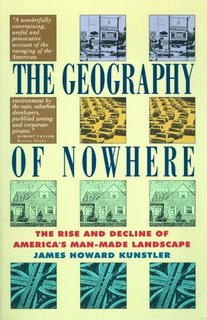
Is a book by James Howard Kunstler, written in the mid-90s lamenting the loss of main streets and coherent communities in America. His main thesis is that the American cry of "you can't tell me what to do with my land!" has resulted in what he calls "scary" places--cement-block buildings, kitsch architecture, and "nowheresville" suburbs. Inner cities have been abandoned for "safer" places, thus making any kind of mutual dependency or community next to impossible (in fact, often the appeal of "the next great place to live" is its exclusivity/privacy/distance from the "down and outs."
I grew up in a neighborhood in Memphis, TN which was originally out in the country (it was on a beautiful pond surrounded by trees) but gradually got taken over by suburban sprawl (read Wal-Mart and six lane highway). Kunstler's book put into words what I had felt most of my life but couldn't express, plus I thought his solutions (you'll have to read the book) were quite in line with a biblical worldview (even though he is quite hostile to Christianity). I wrote him an email to say thanks and didn't think I'd hear back. But what do you know, some authors actually care about their readers! Here's my email and his response:
Hi James,
I wanted to drop you a short note to say "thank you" for your book. I read it this summer. You've given justification (and cogency) to my childhood's "backseat rantings" (as I imagine my parents calling them) about the horrors of living in a suburb. I grew up in a suburban neighborhood in Memphis, TN. I heard about your book through an interview with Thom Yorke in Spin.
One question that kept coming up as I read (I'm a Presbyterian campus minister):
Didn't Christianity/the church play a major role in establishing the town model you celebrate in The Geography of Nowhere? One of the things I lament about the modern church is how it has given up its stance in the center of life (especially in America's cities), and that seems to be concurrent with a weak understanding of/interaction with our own history (and a lack of faith in Christianity's relevance in the modern world). Memphis is a perfect example. When I recently went there to visit family, I noticed all the historically "city-center" or at least "community center" churches have all moved to a non-descript, blasted landscape (yes, pastors can read Ferlinghetti) with literally NOTHING around (no poor people, no buildings, no NOTHING!). They are communicating physically what they've concluded theologically/culturally: "We have nothing to say to the complex problems of life/we are no longer recognized as a source for answers to difficult questions/retreat is the ONLY viable option."
Granting you the modern church's failures, then, where would YOU trace the origins of the community model you're buying into? I'm buying it too, as I think it is a thoroughly BIBLICAL model--you may disagree! :) After all, the Bible begins in a garden and ends in a city!
I would LOVE to hear your thoughts (if you have time).
Cheers,
Joey
KUNSTLER'S RESPONSE:
Joey--
Well, thanks for the compliment.
Must have been an annoying childhood.
I've been to Memphis and the devastation of the city center is impressive.
The origin of the community model I buy into is the American civic experience prior to the end of World War Two.
Jim
"It's All Good"
TO MY READERS AND CORRESPONDENTS: I'm getting swamped with e-mails again, and it is necessary for me to ask for your cooperation. I will gladly answer urgent or compelling letters, but please don't overload me with links, clippings, or plain old chitchat. I appreciate your understanding.

1 comment:
Post a Comment